Tensions continue to flare in Iraq between the U.S. and Iran-supported Iraqi Shi'ite militias following the December 28 U.S. aerial attacks on five Hizbullah Brigades positions in Iraq and Syria (see MEMRI Special Dispatch No. 8447 Reactions In Iraq To The Recent Violent Conflagration – Hizbullah Brigades: 'Trump Will Pay A Heavy Price In Iraq And In The Other Countries Where His Criminal Forces Are Found'; U.S. Bases Will Be Crushed, December 30, 2019).

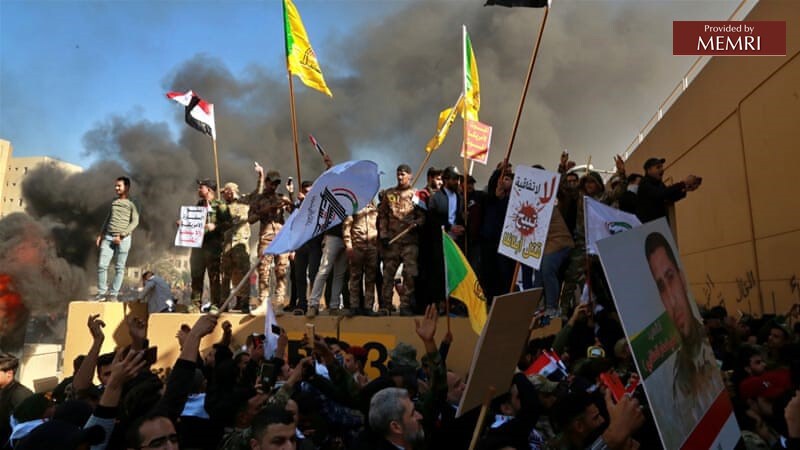
(Sources: Irakna.com, Arabi21.com)
On Tuesday, supporters of the Iraqi Al-Hashd Al-Sha'bi Popular Mobilization Units (PMU) stormed the International Green Zone, the home of several diplomatic corps, scaling the walls of the U.S. Embassy and breaking into the compound in protest of the U.S. airstrikes, which came in response to the December 27 rocket attack on the K1 military base near Kirkuk in northern Iraq, which houses U.S. and coalition forces.
Among today's demonstrators were five militia leaders: Falih Fahad Al-Fayyad, a government appointee and head of the PMU; Hadi Al-Amiri, head of Badr Organization; Qais Al-Khazali, head of 'Asaeb Ahl Al-Haq; Abu Mahdi Al-Muhandis, deputy of PMU commander; and Rayan Al-Kaldani, head of Babelyoon Brigade.
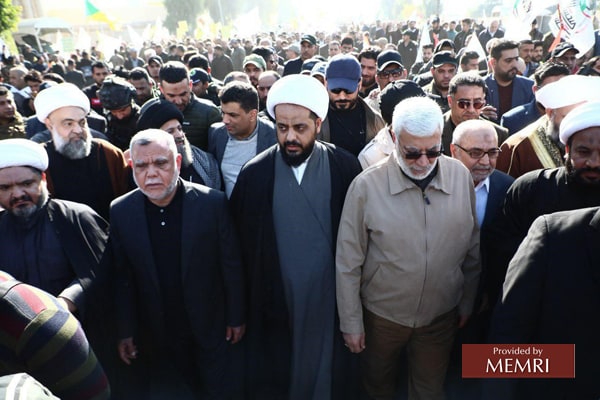
Three of the five militia leaders who attended the protest at the U.S. Embassy, from left to right: Hadi Al-Amiri, Qais Al-Khazali, and Abu Mahdi Al-Muhandis (Source: Dijla TV).
Militia Leader Echoes 1979 Iran Hostage Crisis
Commenting on the storming of the U.S. Embassy in Baghdad, Abu Alaa Al-Walai, leader of Kata'ib Sayyid Al-Shuhada, which is another PMU group, tweeted in praise of the attack saying that "the popular mobilization forces, more accurately the mobilized people, surrounded today the embassy of evil in Baghdad and will soon surround the camps and headquarters of the U.S. killers that are spread all over the Iraqi lands."[1]
He went on to say, that the demonstrators will go further to surround "the embassies of its [the U.S.] tails and submissive countries," naming Saudi Arabia, the UAE, and Bahrain.
Al-Walai concludes by linking today's events to the siege of the U.S. Embassy in Tehran that took place 40 years ago. " The siege of the U.S. Embassy in Tehran back in 1979 extends to today's siege of the embassy in Baghdad, 2019. It summarizes the history: Allah will bring victory to those who support Him." In his tweet, Al-Walai also used a hashtag that reads "#America_out", a play on the "#Iran-out" hashtag used by anti-Iran protesters in Iraq.
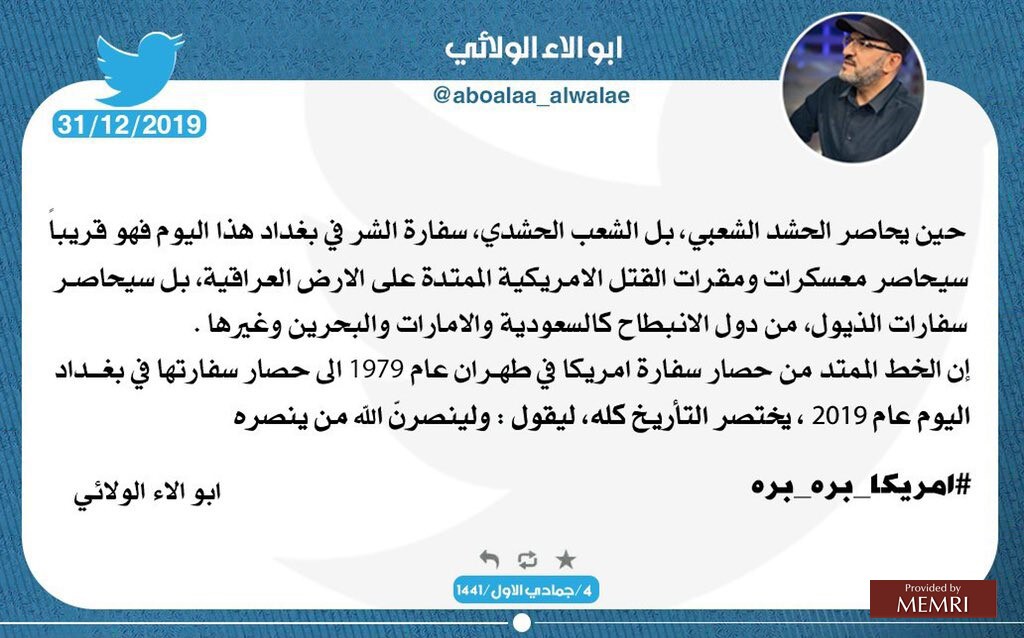
(Source: Twitter.com/aboalaa_alwalae)
Rayan Al-Kaldani, a militia leader sanctioned by the U.S., extended his support to those who stormed the U.S. Embassy with a tweet that shows photos of him attending the demonstration in the Green Zone. "How I like to stand here, there is no confusion in the [political] compass. Here [at the embassy] lies the anger toward the source of the troubles and terrorism, [anger] at an enemy plundering my country and its heritage, killing its old and young people. Here, the Iraqi throats unite and cry out for all the pain that tormented us and all the blood we shed: Long live Iraq and death for the enemies of Iraq and for the reckless Trump policy."[2]
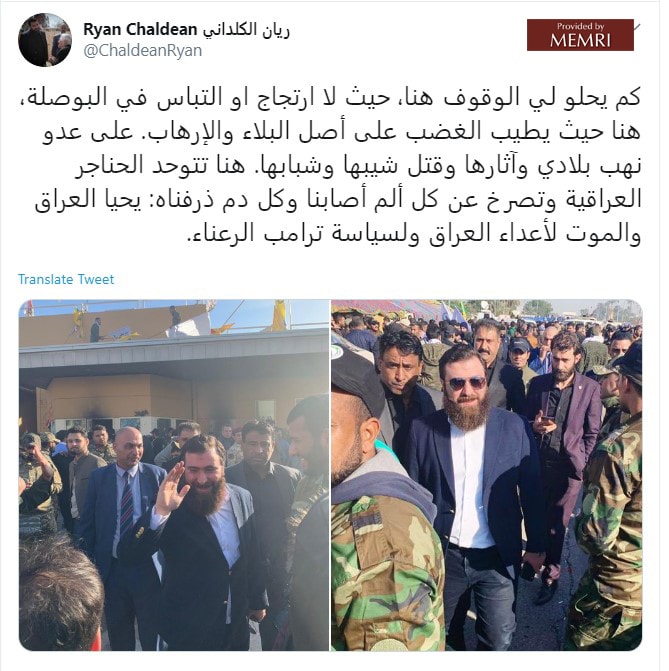
(Source: Twitter.com/ChaldeanRyan)
Prior To Breach Of U.S. Embassy
On December 30, Iraq's top Shi'ite cleric Grand Ayatollah Ali Al-Sistani released a statement condemning "the criminal aggression" of the U.S. against the PMU in Anbar province, calling on Iraqi officials to take "the necessary measures."[3]
The "practices carried out by some sides" must not be used as a reason to violate Iraq's sovereignty, Al-Sistani says, adding that the Iraqi authorities "alone are entitled to deal with these practices and take the necessary measures to prevent them. They are called upon to do so and to ensure Iraq does not become a field for settling regional and international scores and that others do not interfere in its internal affairs."
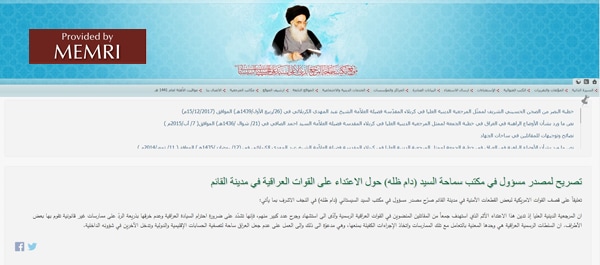
(Source: Sistani.org)
The leader of the Sadr Movement, Muqtada Al-Sadr, released a statement condemning the U.S. airstrikes, and blaming Iraqi politicians who endorse what he described as the "humiliating agreement," in reference to the Strategic Framework Agreement (SFA), that covers the U.S. political, economic, and security relationship with Iraq. Al-Sadr notes that he is willing to throw out "the occupiers" through political and legal means, asking Iraqi political players if "there is anyone to help?"[4]
"If the U.S. forces refuse to withdraw, we will force them to do so," he says. Al-Sadr concludes by denouncing the U.S. forces and President Trump, saying, "the occupation, led by Trump, took advantage of the corruption in Iraq, on the one hand, and the large gap between politicians and the people on the other hand."
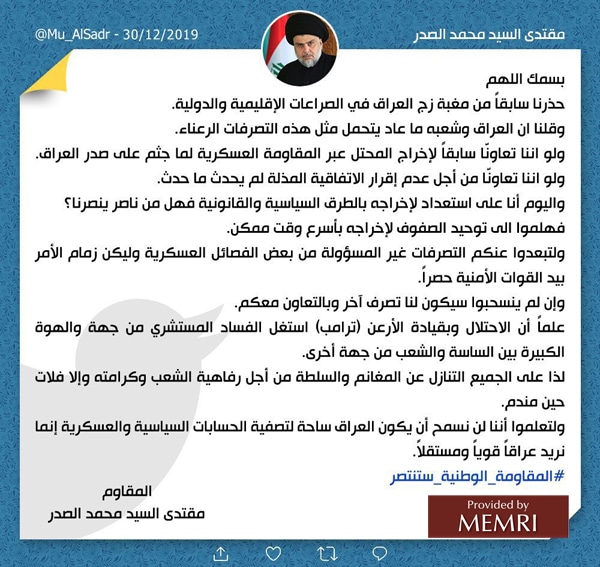
(Source: Twitter.com/Mu_AlSadr)
He further criticized the Iraqi government saying "the weakness of the Iraqi government, political infighting and widespread corruption made Iraq depend on both sides [The U.S. and Iran] and unable to give up on them", according to the statement.
[1] Twitter.com/aboalaa_alwalae, December 31, 2019.
[2] Twitter.com/ChaldeanRyan, December 31, 2019.
[3] Sistani.org/arabic/archive/26373, December 30, 2019.
[4] Twitter.com/Mu_AlSadr, December 30, 2019.





